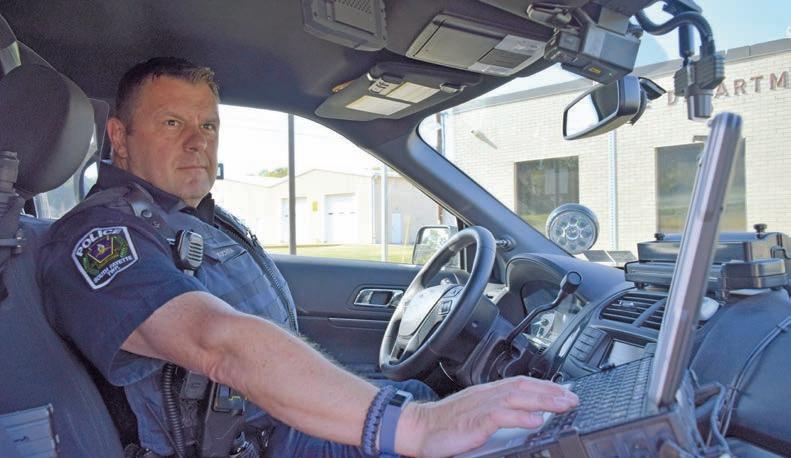
4 minute read
Day Shift
A typical shift in the life of a police officer is anything but routine
For Mike Kuchta, it was a typical day on the job with the South Fayette Township Police Department.
Early in his 12-hour shift on a Thursday in September, Officer Kuchta was patrolling the central part of the township when he pulled up next to a man in a parked car.
Winding down his window, Officer Kuchta asked, “You OK?” The guy was fine; he was an office employee eating lunch.
But it was Officer Kuchta’s duty to stay observant and check on unusual situations to help ensure the safety of citizens.
“Usually everyone’s just doing their thing,” Officer Kuchta said. “I’m not here to make their life miserable. I just want to make sure everything is OK.”

South Fayette Township Police Officer Mike Kuchta is prepared for anything when he hits the road in his police SUV, which serves as a mobile office.
Andrea Iglar
Especially in the summertime, he frequently drives through the neighborhoods to wave to residents and say hello to the children. Such interactions are part of a normal day for a police officer.
While every day isn’t exciting—one could argue it’s better when it is quiet—no shift is ever routine in a round-the-clock police department.
“You really never know what you’re going to get,” Officer Kuchta said. “Anything can happen any time.”
Each shift starts with donning a uniform and as much as 15 pounds of equipment.
Officer Kuchta wears a belt and bulletproof vest that carry a radio, flashlight, pocketknife, taser, gun and ammunition, pepper spray, two pairs of handcuffs, tourniquets and rubber gloves.
His SUV, a Ford Police Interceptor, contains additional supplies and tools, such as secured weapons, ballistic armor, a collapsible baton, extra handcuffs, a dog snare, an automated external defibrillator (AED) for heart issues, a first-aid kit and oxygen tank, Narcan to counteract overdoses, a blanket, caution tape, a fire extinguisher, flares and even teddy bears to cheer up children in crisis.

Officer Kuchta pulls out a red pouch containing Narcan, a medication that counteracts overdoses, from his police vehicle. The car also contains an automated external defibrillator for heart issues, an oxygen tank and other first-aid supplies.
Andrea Iglar
While South Fayette is recognized as a safe community, officers need to be prepared for anything, said Officer Kuchta, who served in Wilkinsburg for two years before joining the South Fayette department 16 years ago. Officer Kuchta (pronounced COOK-tah) also is an emergency medical technician and CPR trainer.
“Just because it’s South Fayette Township doesn’t mean crime doesn’t happen,” he said.
The police vehicle’s backseat is designed to transport someone who has been arrested, while the front is equipped with technology that allows Officer Kuchta to use the car as a mobile office.
During his morning patrol, Officer Kuchta heard ongoing dispatches from Allegheny County’s 9-1-1 center. Some were informational—an ambulance call for a nosebleed and a bulletin about a stolen car—while others prompted immediate action.
When Sgt. Jason Hensel pulled over a car near Interstate 79 for an expired registration, Officer Kuchta joined him to assist.
“You usually try to back up an officer on a traffic stop,” Officer Kuchta said. “There never is a routine stop.”
Flipping on his safety lights, Officer Kuchta stopped behind Sgt. Hensel’s vehicle, at which time a car mounted video camera automatically began saving its recording.
Officer Kuchta radioed his location to dispatch, exited his vehicle, spoke with his colleague, and stood by for a few moments as the sergeant issued a warning to the driver.
Officers can scan a driver’s license or registration card and then produce a warning or citation on a small printer that’s attached to the dashboard.
Traffic enforcement always is part of a typical shift, Officer Kuchta said, and each officer has leeway in how to deal with specific situations.

Officer Kuchta receives dispatches and information about regional police calls on a computer mounted in the front of his vehicle. Other technology includes a video recorder (above the rearview mirror) and a printer to create warnings and citations (above the dashboard vents).
Andrea Iglar
“Using your discretion is a pretty powerful tool as an officer. You don’t always have to write a ticket,” Officer Kuchta said, recalling advice he heard 20 years ago from an experienced officer:
“I’m here to help people,” he said. “I’m trying to educate them a little bit. You don’t have to make it a bad experience.”
After a takeout lunch, eaten at the station with fellow officers, Officer Kuchta drove back and forth between two parties who had been involved in a domestic dispute the night before.
“Basically, we’re just keeping the peace,” Officer Kuchta said. “That’s what a police officer does a lot of the time: mediates problems.”
Back at the station, Officer Kuchta completed some administrative tasks, including a phone call and report related to a car accident.
As the officer in charge of storing and documenting evidence, he also researched the proper procedure for accepting a certain type of evidence, which would be securely stored in a locker and then sent to the Allegheny County crime lab for testing.
Before the end of his shift, Officer Kuchta also would need to complete a Daily Activity Report, showing how he spent his time and helping keep the next shift in the loop.
Every police shift—whether day or night, routine or unusual, active or quiet—requires officers to stay on guard and be ready for anything in order to serve and protect citizens.
“I’m impressed with how many people thank me for my service,” Officer Kuchta said.
“The majority of us are just out trying to do the right thing and do a good job and enforce the law.”


